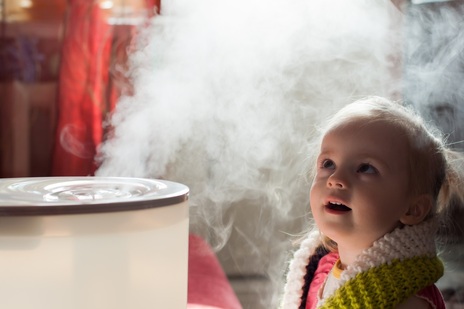Most homeowners focus more on maintaining desirable temperatures in their houses than maintaining a balanced humidity level. This is the amount of water moisture in the air, which can be too high in the hot season or too low in the cold months. Excessively high or low moisture levels can cause health issues and other problems in your home.
Luckily, you can use humidifiers and dehumidifiers to maintain the optimum humidity level. Here is everything you need to know about humidifiers and dehumidifiers, including their capabilities, purposes, and how they can help keep your house comfortable throughout the year.
The Differences Between Humidifiers and Dehumidifiers
The only similarity between humidifiers and dehumidifiers is that they both work to regulate the humidity level. Humidifiers add moisture to the air to make it less dry while dehumidifiers draw water from the air when it’s too humid. During the winter season, the air is usually dry and cold. Also, people tend to run their heating systems often, which makes the air even drier. In such situations, you will need a humidifier.
On the other hand, the summer season requires a dehumidifier since it’s usually more humid. The role of a dehumidifier is to eliminate seasonal allergies and prevent the sticky stale feel in a house. Humidifiers moisten your skin and nasal passage, and they are particularly essential in children’s rooms.
Types of Humidifiers and How They Work
There are two humidifier types that you can consider based on your preferences. The cool-mist humidifiers emit cool water droplets into the air. They include ultrasonic, impeller, and evaporators. Since the water stays cold, it can help cool your house too. Cool-mist humidifiers are pretty safe, especially if you have kids since they don’t use hot water that can spill. However, if you fail to clean this humidifier well, it can carry airborne bacteria, making it counterproductive.
For the warm-mist humidifiers, you will need to plug them into an electric outlet. The humidifier then heats the water until boiling and emits the steam into the air. One good thing about the warm mist is that it boils away pathogens and bacteria before releasing the water.
Types of Dehumidifiers and How They Work
You also have a chance to choose between two types of dehumidifiers. The refrigerative dehumidifiers have a fan that draws out moist indoor air and moves it over cool metal coils. The coils condense the water and then blow back dehumidified cold air into the house. This is the right option for everyday household use.
On the other hand, the desiccant dehumidifier uses a desiccant chemical to absorb moisture from the air. This option works best for commercial purposes in pharmaceutical or food storage areas.
The Benefits of Using Humidifier During Winter
During winter, the air is usually dry since cold air can’t hold much moisture. You may want to install a humidifier if you live with a person with compromised immunity. Humidifiers help combat air dryness during winter, which prevents infections like sore throat, bronchitis, sinus, cold, influenza, and nose bleeding.
You should install the humidifier in the main rooms of your house together with the HVAC system. Always set the humidifier to about 30% during winter. The amount of square footage a humidifier can handle will vary, so it’s good that you consult a professional to help choose the right size for your space. Generally, a good humidifier will help improve your indoor air quality, reduce the spread of the airborne virus, preserve wood furniture, and prevent chapped lips.
Do You Need a Dehumidifier in Winter?
If your home has a humidity level above 50%, you will need a dehumidifier. As mentioned earlier, a dehumidifier does the opposite of a humidifier. It pulls out excess moisture from the air, meaning that it will make the air drier if you use it during winter. However, you can use your dehumidifier during winter in your basement.
Naturally, the basement traps more moisture, creating a perfect breeding ground for mold and mildew. Heated basements also accumulate more heat, making the humidity level a little higher than in other areas of your house. Running a dehumidifier in your basement all year round will help prevent mold growth. If you choose to use your dehumidifier in the cold months, monitor it regularly to avoid coil freezing, which can damage the unit.
How to Choose Between a Humidifier or Dehumidifier
The humidity level in your house will help determine whether you need a humidifier or dehumidifier. Install a dehumidifier if you move to a new area and develop severe allergic symptoms. This is also an ideal option if your house leaks after the rain. Install a dehumidifier if you begin to notice that your clothes take an excessive amount of time to dry, your home smells wet, or there is excessive mist on the windows. A dehumidifier is also essential once you start seeing pests like silverfish or spider fish. Installing a dehumidifier will help lower the air moisture and drive away such pests.
On the other hand, you may want to use a humidifier during the winter if you live in a poorly insulated house that lets in dry, cold air. Consider this option if your family experiences frequent dry hair, chapped lips, or nose bleeds. Note that low humidity results in the generation of a higher static charge. If you experience static shock from your surfaces often, consider installing a humidifier. Also consider getting a humidifier if you spot cracks on wood floor panels or furniture during winter.
If you have potted plants in your house, you must constantly monitor the humidity level. Dry air means that you need to water the plants often, and they might dry out.
Are You Struggling With Humidity Issues? Speak With a Specialist Today
Most homeowners find it challenging to maintain a balance in the indoor air moisture content. Imbalanced humidity will make your home uncomfortable, attract mold, and increase the risks of contracting respiratory illnesses. You can use either a humidifier or dehumidifier to maintain the desirable air moisture level. With the proper relative humidity level, you will begin to notice that everybody breathes easier.
Remember that humidifiers work best in winter while dehumidifiers are typically needed during the summer. You may want to have both to prepare for different times of the year when the humidity level changes. Note that most well-insulated homes won’t need to use dehumidifiers or humidifiers throughout the year. If you are struggling with humidity issues, consult a professional, and they will advise you on the best solution.
If you need help maintaining a safe humidity level throughout the year, get in touch with Reliable Air Conditioning. Our company specializes in indoor air quality, furnace, and AC services. We also offer radiant heating and ductless mini-split services in Mesa, AZ, and the surrounding areas. Call us now to schedule an appointment or learn more about our services.



